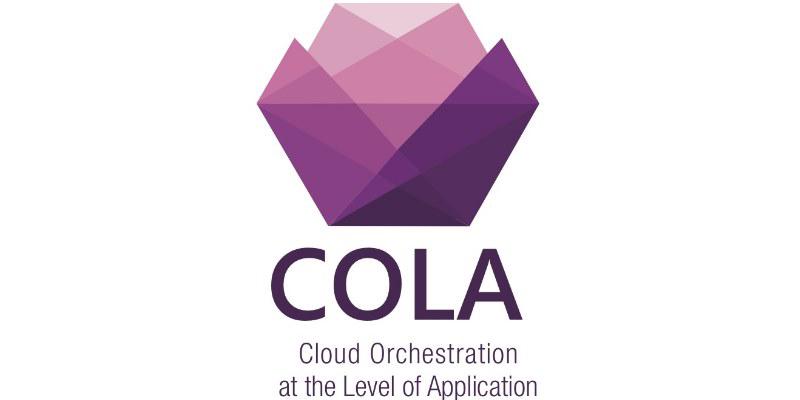
COLA
Cloud Orchestration at the Level of Applications
Andreas Ocklenburg
01 January 2017
30 September 2019
EC funded project
Introduction
The COLA project aims to increase the adoption of cloud computing services by SMEs and public sector organisations. Building on and extending current research results, it defines and provides a reference implementation of a generic and pluggable framework that supports the optimal and secure deployment and run-time orchestration of cloud applications.
COLA demonstrates the applicability and impact of the solution via large scale near operational level SME and public sector pilots and demonstrators, and also defines a clear pathway how the innovation can be delivered to the market.
Who is the project designed for?
The target users of the outcomes of the COLA project are application developers. The targeted developers are implementing industry and/or public sector applications that require resource scalability and efficient resource utilization. While IaaS clouds typically offer elasticity, applications cannot automatically utilize these features. Developers need to build in custom code to every single application in order to support its automatic scaling up and down.
The aim of the COLA project is to ease this pain of application developers regarding automated scalability. COLA develops a generic set of services (called MiCADO) that provide dynamic and automated resource scalability on clouds for all (or at least a very wide range of) applications.
MiCADO services can be expressed with a set of well-defined (standardized) interfaces to be easily embedded into application control code without changing the original application logic. Moreover, MiCADO services can connect to multiple cloud middleware (e.g. EC2, CloudSigma etc.) or generic cloud access layer (e.g. CloudBroker Platform) via a set of well defined (standardized) interfaces too.
Data consistency, data protection, trustworthiness and access control are handled in a secure way when sharing and migrating applications within a single cloud or between heterogeneous cloud platforms.
How will your project benefit the end-user?
The results of the COLA project will enable generic application developers who wish to utilize cloud resources, to implement applications that automatically optimize cloud resource utilization based on application developer/operator defined quality of service parameters.
Application developers will be able to extend their application code with MiCADO service calls (the generic set of services developed by the COLA project) in order to utilize the scalability and optimization services at both deployment and also at run-time.
Application operators will be able to define desired quality of service parameters, e.g. maximum response/completion time, maximum cost, security policy requirements etc. MiCADO services will assure that the application is deployed in an optimal way based on the defined QoS parameters.
Moreover, MiCADO services will monitor the application at run-time and will automatically scale it up or down in order to optimize application execution based on the user-defined multidimensional set of QoS parameters. Users/application operators can also modify the QoS parameters during run-time to trigger rescaling of resources, if necessary.
Please briefly describe the results your project achieved so far
COLA collected and elicited requirements from its three use-cases, and based on these requirements and also on detailed analysis of existing related solutions defined a generic architecture for MiCADO.
The development of the MiCADO framework is currently ongoing and includes the design and implementation of the core architecture to support application scalability based on user defined policies, the specification of a TOSCA-based application topology and policy description format, and the definition and implementation of a security framework supporting the core architecture and the policies.
The first prototype of the MiCADO architecture and the topology and policy description formats are now available and currently being trialed by the COLA use-case partners. Version 3.1 of the MiCADO framework with detailed tutorials is available for download via the COLA project website.
What are the next steps for your project?
As next steps, the project is collecting and analyzing feedback from the use-case partners regarding their experiences when utilizing the early releases of MiCADO. Based on this feedback and the original road-map of the project, the implementation of the framework continues in order to support technical and business requirements of the targeted user communities.
A specific aspect of this implementation is the MiCADO security framework and security enforcer layer that is now specified and designed, and its implementation has just kicked off in the second quarter of 2018.
Category:
- National and international security and governance
Vertical Category:
- ICT
Products
Are you looking for new Cybersecurity or Privacy services?
Find the right solution for your security needs!
Auto-scaling Framework for Docker container orchestrated by Kubernetes [Infrastructure as Code]
Resources for EU Research
Resources for SMEs
News & Events
Reports
Cyberwatching.eu has received funding from the European Union’s Horizon 2020 research and innovation programme under grant agreement No 740129. The content of this website does not represent the opinion of the European Commission, and the European Commission is not responsible for any use that might be made of such content. Privacy Policy | Disclaimer / Terms and Conditions of Use



